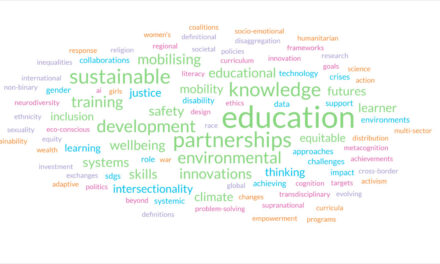Highlights from theme convenors of one of seven UKFIET 2025 conference themes, ‘Equitable partnerships and cross-cultural collaboration’: Rhona Brown (Lecturer in Education, University of Glasgow) and Amy Lightfoot (Academic Director, English and School Education, British Council).
What excites you about your theme?
Partnerships are the foundation of all aspects of education. Reading through the submissions for this UKFIET conference sub-theme, it is clear that they take many forms: partnerships between learners and their teacher; between a school and parents and caregivers; between local education authorities and national bodies responsible for education policy; and between outside agencies and organisations and ministries of education. Exploring this theme has already brought fascinating insights as we read our way through the large number of submitted proposals. These offered multiple perspectives on the theme we set out in the initial conference call.
Most exciting and, we believe, useful, are the stories and opportunities to explore where partnerships haven’t worked, or where teams have been able to step back, reflect and take a critical look at the partnerships they’re involved in. This takes bravery – it’s much easier to showcase the positive, as we all know. We applaud those who have come forward to share the lessons they have learned so that we can, too. We can learn a lot from the details of what teams have done to get things back on track, or the reflections they have taken with them for future collaborations.
Reading these submissions reminded us of the origin of collaboration as ‘co-labouring’ or ‘toiling together’ – and of advice we have also been given over the years – ‘If it’s not hard, you probably aren’t doing it right!’
How does this link to the overall 2025 conference theme and global landscape?
Driven partly by shifts in funding sources, things have been and are changing in our sector, while at the same time the demand and need for quality education continues – and becomes ever more urgent. The selected papers under the Equitable Partnerships and Cross-Cultural Collaboration sub-theme show acute awareness of the current political landscape and the climate, humanitarian and democratic crises we are facing.
The papers highlight many of the related challenges being faced in partnership work in our sector, including extractivism; inattention to race and racism; the rollback of gender rights; structural and epistemic inequalities; and unequal North-South power dynamics. They also highlight that we’re going to have to work differently, to both resist the attacks on the ways of working we have developed and to find new ways of democratising knowledge production and mobilisation in times of uncertainty. Now it is more important than ever to find ways to work together and bridge divisions.
What kind of sessions/papers can we expect to find under your theme?
It was a pleasure but also a bit painful reading through all of the submissions for our sub-theme. A pleasure because it was so inspiring to read about all the excellent, reflexive partnership working that is taking place around the world, and painful for the same reason: it wasn’t easy to make our final selection to fit our allocated space in the overall programme. Nevertheless, we have ended up with what we believe is a thought-provoking set of sessions, featuring partnerships and cross-cultural collaboration undertaken by authors representing 18 countries and 37 institutions.
A key element of our theme takes into account the inevitable power structures and imbalances that partnerships operate within. Several authors express frustration at the ‘proliferation of guidelines and initiatives’ around ‘equitable partnerships’ that continue to neglect global South voices and contexts. This is accompanied by calls to reimagine what equitable partnerships can and should look like, for example, through a creative session that uses a River of Life approach to explore the “challenges, detours, and unexpected opportunities” of partnerships.
Several sessions focus explicitly on how to make partnerships more equitable, including a symposium involving academics from the Global South and Global North discussing how ‘racism plays a key role in reproducing colonial power hierarchies in educational partnerships’. Another symposium brings together experience from a wide range of contexts to focus on how we can ‘transform funding mechanisms, institutional practices, and academic cultures to promote truly equitable partnerships’.
It was clear from the submissions that there is demand and interest in improving partnerships, and recognising the benefits that working together can bring to many aspects of the education system. We have tried to reflect this in the way we have grouped papers and quick-fire sessions, for example, bringing together presenters who are talking about working together at the system level, and another session where we have a set of quick-fire papers exploring how partnerships can help at the practitioner level to improve teaching, learning and wellbeing.
The challenges outlined by authors can seem overwhelming; however, the selected submissions also offer up clear reasons for hope, and practical pathways and recommendations for ways forward. Importantly, they show that this UKFIET conference presents a much-needed space and opportunity to forge new relationships and solidarities to strengthen education partnerships.
We hope this blog gives a flavour of what is to come. Please do explore the full programme. We look forward to seeing you there.




